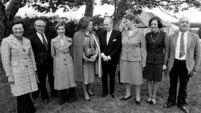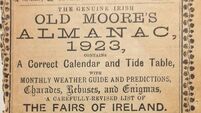The magic of the overseas Christmas parcel in 1950s' Ireland
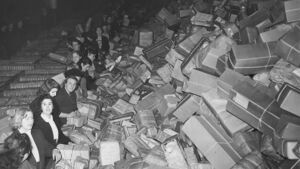
An enormous pile of parcels at Mount Pleasant Post Office, London, being sorted by some of the extra staff employed to cope with the Christmas rush in the 1950s. Picture: Fox Photos/Getty Images
I learned to cycle when I was nine years old. In the 1950s, there were very few small or children’s bicycles, at least in the area where I lived. On rare visits to town, I occasionally caught a glimpse of a child’s tricycle or scooter and my envy knew no bounds.
At home, my father had a big heavy Raleigh bicycle with a big front carrier, which he used in his work as he was the local postman and he tolerated no messing with his pride and joy. I could have a go, he kept telling me, when my legs were long enough to reach the pedals.
Then my luck changed and we became owners of a rather old but perfectly usable ladies bicycle with a carrier on the back. My mother had never learned to cycle when she was young as she came from Inisheer, the smallest of the Aran Islands, and nobody on the island had a bicycle at that time.
As we lived in a very remote part of our village, my father convinced her that she could learn to cycle so they decided to make the purchase. My mother proved reluctant to try cycling while my father was away, so I became the immediate beneficiary and in a few weeks could manage perfectly; at least judged by the reduced number of times I fell.
Cycling was a great improvement on walking to the local shop which was more than a mile away and the real advantage became apparent when I learned how to cycle carrying a can of spring water from the well, which was located adjacent to the shop. The real test of my ability and endurance came however, on the few days before Christmas when, at my suggestion and despite my mother’s reluctance and my father’s skepticism, my offer to help with the myriad of Christmas parcels coming from relations in England and America was deemed worth a try. My father often spent until midnight delivering parcels in the week before Christmas.
On the first day of the school holidays, I arrived at the Post Office about ten o’clock at which time the post was sorted for delivery and the parcels arrayed in order of delivery, while the letters were all crammed into a bulging mailbag which the postman wore like a schoolbag, over his shoulder. My father fixed a large front carrier, which was in the Post Office, to my bicycle, just as he had on his. Carriers, both front and back on both bicycles, were loaded with as many parcels as would fit and were tied securely in place. We then set off on the postal round.
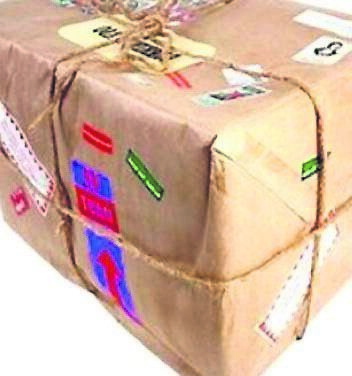
My load of parcels was first to be delivered as he recorded each in his little book; after which I cycled back to the Post Office for the second consignment. The Post Mistress helped me load and secure the next lot for delivery and then I set off to meet my father at a prearranged location. And so it continued all day until we had all parcels delivered shortly after darkness fell.
At about midday, my father had asked me to go with him to one of the houses. The mother, father, grandmother and five children, the eldest of which was slightly older than me, all came out to warmly welcome the postman and probably more importantly to them, his precious cargo. Some letters were first handed over and after a casual glance, put up on the mantle-piece for opening later. The parcel however was received with great reverence and excitement while expectations were palpable as it was placed carefully in the middle of the kitchen table. The mother shooed everyone away as she attended to her guests with steaming mugs of tea and slices of currant bread lavishly coated with butter and jam.
When the messengers were attended to, the lady of the house directed her attention towards opening the parcel. It had taken great effort for the children to restrain themselves as they gathered around the table and gently touched the paper until pulled away by one of the siblings who moved into position to do likewise. Their father, in casual conversation with the postman, managed to saunter close enough to lift the parcel gently, testing as it were, that the weight would not prove more than the sturdy table could support. The grandmother herself, while gently advising everyone to “settle down”, shuffled close enough to scrutinise the address and carefully study the colourful American stamps.
The mother, after what must have seemed an age to the others, armed with a scissors, eventually approached the parcel as a circle of excitement and anticipation formed to watch her every move. First she checked the knots on the string and laboriously untied all but the most difficult, which had to be cut by scissors. The twine was handed to Grandmother to roll into a ball as American string was much stronger than what was available in the West of Ireland, and would have many uses into the future.
The paper was then carefully removed and folded; strong brown paper was a great asset to any country-house of the 1950s. Then the flaps of the cardboard box were slowly unfolded and despite mother’s loudest protestations, all hell broke loose as multiple hands, big and small, old and young reached in to see what wonders could be found in the Aladdin’s Cave of an American parcel.
The pandemonium lasted only a few minutes at which time the business of adjudicating on what was for each and what was for general usage was overseen by the two ladies. And contents of parcels from America or England proved varied and exotic compared to the normal fare available to families of that time. There were the useful, and hardly worn if not new, garments for all the family including footwear and ‘galoshes’, waterproof overshoes, which caused much fascinated and were not available locally.
Occasionally there were garments that provoked wonder or hilarity to those who knew what they were and would mischievously wear them discreetly beneath the most modest and demure attire. Such garments were never seen on the washing line but might be dried by the heat of the sun on a low hedge at the back of the house while the children were at school. Lack of appreciation by the less well informed often resulted in bounding a horse’s fetlock or repairing worn hardness or tying a rickety garden gate with the latest New York or London lingerie. Similarly expensive fountain pens and newfangled ‘biros’ were often discarded due to constant blotting after dipping in an inkwell as were safety razors lacking blades and chewing gum not to be swallowed.
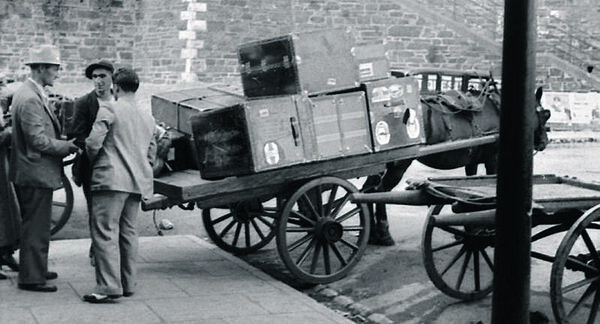
Lots of luxuries were greatly appreciated however; jars of peanut butter, tins of granulated coffee, boxes of American Candy, iced miniature Christmas cakes, packages of ‘teabags’, many of which were ripped open and contents deposited in the pot before boiling water was poured.
There were toys and comics for the children, cosmetics for the ladies, ties for the men many of which supported work trousers or provided fetters for straying donkeys, large red candles, decorations for Christmas trees which did not appear in country houses until many years later and hosts of household tools and gadgetry, much of which was never deciphered or found fit for any purpose. The opening of parcels might have been a little more muted in other houses but the joy and excitement were always present.
There were some, however, who never received parcels; old people living alone with no relations overseas or whose family no longer made contact. One such old lady on our route was Bea who lost most of her family to the dreaded TB. She always said she had two nephews in Chicago but nobody knew of them as they were born there and never visited Ireland. Contact was lost with the family when her brother died.
Bea lived a lonely existence; surviving tolerably well only because good neighbours collectively saved her turf and planted and reaped her tillage of potatoes and vegetables and supplied her with milk each day. In her later years, they decided she should receive a Christmas Parcel; delivered by the postman on Christmas Eve. And so, as each contributed part of what they themselves received, a parcel of useful items with some cake and sweets and a big red candle and a loving note from her nephews was prepared and wrapped and had the address altered. It was given to the postman to deliver on Christmas Eve. She was overjoyed and would speak of the joy of receiving the parcel from her relatives until she began to anticipate what she might expect next Christmas. She gave most of the sweets to neighbouring children but ate every scrap of the cake which she enjoyed. She died shortly before the last Christmas I assisted with the mail.
I accompanied my father in such a way for several years but as we moved into the 1960s, the number of parcels began to dwindle. They were replaced by registered letters which contained Dollars and Sterling rather than the treasures that gave so much excitement and joy in the austere 1940s and ’50s. Shops in local towns began to stock luxuries which a few years earlier came only via the postman’s bicycle.
I look back with great joy on those weeks before Christmas when I helped bring so much excitement, happiness and joy to many, including ourselves, who had little other than the fruit of our own efforts, the security of good neighbours, the goodwill of relations in distant lands and the joy of Christmas to lift spirits in the middle of dreary winters. That long-ago era is best epitomised for me by the memory of cycling home in the dark, having delivered the last of the Christmas parcels past Bea’s house, with a bright red candle lit in her window as she read and reread the brief note from her nephews in Chicago which they would surely have sent if they knew how much it meant to her.
First published in the Western Star, Christmas 2020. Reprinted in memory of the author Padraic Neary, ‘Bansra House’, Charlestown Road, Tubbercurry, Co Sligo, who died on March 11th, 2023. Rest in peace, Padraic.

